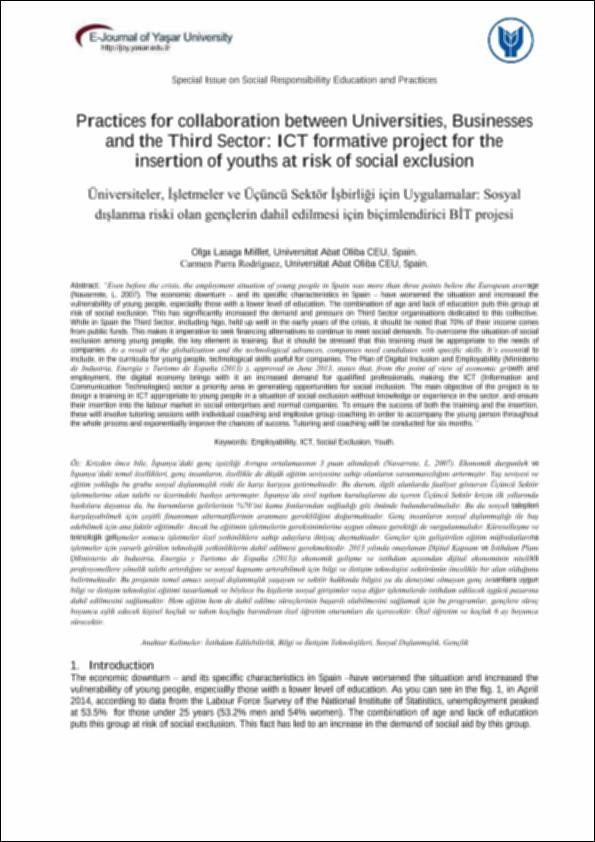Por favor, use este identificador para citar o enlazar este ítem:
http://hdl.handle.net/10637/11229Practices for collaboration between Universities, Businesses and the Third Sector: ICT formative project for the insertion of youths at risk of social exclusion
| Título : | Practices for collaboration between Universities, Businesses and the Third Sector: ICT formative project for the insertion of youths at risk of social exclusion |
| Autor : | Lasaga Millet, Olga Parra Rodríguez, Carmen |
| Resumen : | “Even before the crisis, the employment situation of young people in Spain was more than three points below the European average (Navarrete, L. 2007). The economic downturn – and its specific characteristics in Spain – have worsened the situation and increased the vulnerability of young people, especially those with a lower level of education. The combination of age and lack of education puts this group at risk of social exclusion. This has significantly increased the demand and pressure on Third Sector organisations dedicated to this collective. While in Spain the Third Sector, including Ngo, held up well in the early years of the crisis, it should be noted that 70% of their income comes from public funds. This makes it imperative to seek financing alternatives to continue to meet social demands. To overcome the situation of social exclusion among young people, the key element is training. But it should be stressed that this training must be appropriate to the needs of companies. As a result of the globalization and the technological advances, companies need candidates with specific skills. It’s essential to include, in the curricula for young people, technological skills useful for companies. The Plan of Digital Inclusion and Employability (Ministerio de Industria, Energía y Turismo de España (2013) ), approved in June 2013, states that, from the point of view of economic growth and employment, the digital economy brings with it an increased demand for qualified professionals, making the ICT (Information and Communication Technologies) sector a priority area in generating opportunities for social inclusion. The main objective of the project is to design a training in ICT appropriate to young people in a situation of social exclusion without knowledge or experience in the sector, and ensure their insertion into the labour market in social enterprises and normal companies. To ensure the success of both the training and the insertion, these will involve tutoring sessions with individual coaching and implosive group coaching in order to accompany the young person throughout the whole process and exponentially improve the chances of success. Tutoring and coaching will be conducted for six months. |
| URI : | http://hdl.handle.net/10637/11229 |
| Derechos: | L'accés als continguts d'aquest document queda condicionat a l'acceptació de les condicions d'ús establertes per la següent llicència Creative Commons: http://creativecommons.org/licenses/by-nc-nd/4.0/ |
| Fecha de publicación : | 2015 |
| Centro : | Universitat Abat Oliba CEU |
| Aparece en las colecciones: | Documents de recerca |
Este ítem está sujeto a una licencia Creative Commons Licencia Creative Commons



